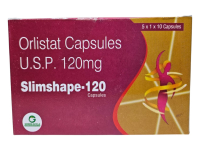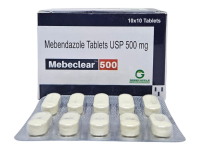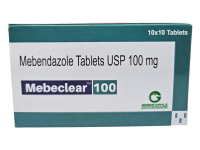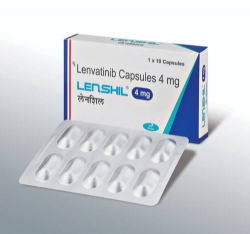


Lenvatinib
Trade name: Lenvima ™.
Lenvatinib is a generic drug under the trade name Lenvima ™. In some cases, healthcare professionals may use the trade name Lenvima ™ when referring to the generic drug name lenvatinib.
Drug type: Lenvatinib is a targeted therapy. It is an oral receptor tyrosine kinase inhibitor - (See "How this drug works" below for more details).
What Lenvatinib is used for:
- For the treatment of patients with locally recurrent or metastatic progressive radioactive iodine-resistant differentiated thyroid cancer.
- In combination with everolimus for the treatment of advanced renal cell carcinoma after one previous antiangiogenic therapy.
- Treatment of hepatocellular (primary) liver cancer.
- In combination with pembrolizumab for the treatment of patients with advanced endometrial cancer.
Note. If a drug has been approved for a single use, doctors may decide to use the same drug for other problems if they think it might be helpful.
How Lenvatinib is given:
- Lenvatinib is a tablet taken by mouth once a day. It can be taken with or without food.
- Take Lenvatinib exactly as prescribed.
- Swallow Lenvatinib Capsules whole. Do not crush, dissolve, or open capsules.
- Do not change your dose or stop taking lenvatinib unless your doctor tells you to.
- If you miss an appointment, take it as soon as you remember. If your next dose is within 12 hours, skip the missed dose and take your next dose at the usual time.
- Do not take more than 1 dose of Lenvatinib at a time. If you have taken too much, call your doctor immediately.
- The amount of lenvatinib you get depends on many factors, your general health or other health problems, and the type of cancer or condition being treated.
- Dose changes are often made, so it is important to inform your doctor of any side effects.
Side effects:
Important things to remember about the side effects of lenvatinib:
- Most people do not experience all of these side effects.
- Side effects are often predictable in terms of their onset and duration.
- There are many ways to minimize or prevent side effects.
- There is no relationship between the presence or severity of side effects and the effectiveness of a drug.
The following side effects are common in patients taking lenvatinib (occurring in more than 30%) :
- High blood pressure
- Diarrhea
- Fatigue
- Joint / muscle pain
- Decreased appetite
- Weight loss
- Nausea
- Stomatitis (mouth ulcers)
- Headache
- Vomiting
- Proteinuria (protein in the urine)
- Palmar-plantar erythrodysesthesia (hand-foot syndrome)
- Abdominal pain
- Dysphonia (difficulty speaking)
These side effects are less common side effects (occurring in about 10-29%) in patients receiving lenvatinib:
- Constipation
- Oral pain
- Cough
- Swelling
- Rash
- Taste changes
- Dry mouth
- Dizziness
- Heartburn
- Hair loss
- Bleed nose with
- Insomnia (sleep problems)
- Urinary tract infection
- Dental and oral infections
Not all side effects are listed above. Some of them, which are rare (occurring in less than 10% of patients), are not listed here. However, you should always tell your doctor if you experience any unusual symptoms.
When to contact your doctor or healthcare provider:
Call your doctor immediately, day or night, and go to the emergency room if you experience any of the following symptoms:
- Fever 100.4 ° F (38 ° C or higher, chills)
- Symptoms of heart problems, such as shortness of breath or swelling
- Symptoms associated with a possible blood clot, such as: chest pain or pressure; pain in the arms, back, neck, or jaw; numbness or weakness on one side of the body; trouble speaking; sudden or severe headache; sudden changes in vision
- Severe pain in the abdomen (belly)
- Severe headache, seizures, weakness, confusion, blindness, or vision changes. This may be a rare syndrome called reversible posterior leukoencephalopathy.
The following symptoms require medical attention but are not urgent. Contact your doctor within 24 hours after you notice any of the following:
- High blood pressure
- Diarrhea (4-6 episodes in 24 hours).
- Nausea (interferes with eating and does not go away with prescribed medication).
- Vomiting (more than 4-5 times a day).
- Inability to eat or drink for 24 hours or signs of dehydration: fatigue, thirst, dry mouth, darkness and decreased urine output or dizziness.
- The skin or whites of the eyes turn yellow
- The urine turns dark or brown (tea color)
- Light-colored feces
- Decreased appetite
- Pain in the right side of the abdomen
- Bleeding or bruising is lighter than usual (nosebleeds, coughing up blood, heavy vaginal bleeding, rectal bleeding)
- Skin changes (rash, acne, itching, blistering, flaking, redness, or swelling).
Always tell your doctor if you experience any unusual symptoms.
Precautionary measures:
- Before starting treatment with lenvatinib, be sure to tell your doctor about any other medicines you are taking (including prescription, over-the-counter, vitamins, herbal medicines, etc.).
- While taking lenvatinib, do not get any immunizations or vaccinations without your doctor's approval.
- Tell your doctor if you are or may be pregnant before starting this treatment. Pregnancy category D (Lenvatinib may be hazardous to the fetus. Pregnant or pregnant women should be warned of the potential hazard to the fetus).
- For both men and women: Do not conceive (get pregnant) while taking lenvatinib. Barrier methods of contraception, such as condoms, are recommended during treatment and for at least 2 weeks after completion of therapy. Talk with your doctor about when you can safely get pregnant or conceive after therapy.
- Do not breastfeed while you are taking this medicine.
Self-care tips:
- High blood pressure can be a side effect of lenvatinib. Blood pressure must be well controlled before starting lenvatinib. Your healthcare provider will check your blood pressure regularly during treatment.
- Drink at least two to three liters of fluid every 24 hours, unless instructed otherwise.
- If you feel nauseous, take your nausea medication as directed by your doctor and eat small meals often. Lozenges and chewing gum may also help.
- Avoid sun exposure. Use SPF 30 (or higher) sunscreen and protective clothing.
- In general, drinking alcoholic beverages should be minimized or avoided altogether. You should discuss this with your doctor.
- Ample time to rest.
- Maintain proper nutrition.
- Lenvatinib may cause tiredness, weakness, or blurred vision. If you have any of these symptoms, be careful when driving a car, using machinery, or anything that requires you to be vigilant.
- If you experience symptoms or side effects, be sure to discuss them with your healthcare provider. They can prescribe medications and / or offer other effective solutions to address such problems.
Monitoring and testing:
You will be checked regularly by your doctor while you are taking lenvatinib to monitor side effects and check your response to therapy. Testing may include but is not limited to:
- Arterial pressure
- Liver and kidney function
- Electrolytes
- Protein level in urine
- Electrocardiogram (ECG)
- Thyroid hormone levels
How Lenvatinib Works:
Targeted therapy is the result of nearly 100 years of research into understanding the differences between cancer and normal cells. Today, cancer treatment focuses primarily on killing rapidly dividing cells, because one of the characteristics of cancer cells is their rapid division. Unfortunately, some of our normal cells divide quickly too, causing many side effects.
Targeted therapy is about identifying other characteristics of cancer cells. Scientists are looking for specific differences between cancerous and normal cells. This information is used to create targeted therapies to attack cancer cells without damaging normal cells, resulting in fewer side effects. Each type of targeted therapy works slightly differently, but they all affect the ability of a cancer cell to grow, divide, repair, and / or bind to other cells.
There are various types of targeted therapy, divided into three broad categories. Some targeted therapies focus on the internal components and functions of the cancer cell. Targeted therapy uses small molecules that can enter the cell and disrupt the function of the cells, causing them to die. There are several types of targeted therapies that focus on the inner parts of cells. Another targeted therapy targets receptors outside the cell. Receptor targeted therapy is also known as monoclonal antibodies. Antiangiogenesis inhibitors target blood vessels that supply oxygen to cells, ultimately causing cells to starve.
Lenvatinib is a targeted therapy that targets and binds to tyrosine kinase receptors and inhibits vascular epidermal growth factor receptor (VEGFR), vascular endothelial growth factor (VEGF) and inhibits other kinase receptors that are involved in pathogenic angiogenesis, tumor growth and cancer progression in addition to their normal cellular functions, including fibroblast growth factor (FGF) receptors and platelet growth factor alpha (PDGFRa) receptor, KIT and RET on the cell surface. By binding to these receptors, lenvatinib blocks important pathways that promote cell division.
Research continues to determine which cancers are best treated with targeted therapies and to identify additional targets for more cancers.
Note. We strongly recommend that you talk to your healthcare provider about your specific medical condition and treatments. The information contained on this website is useful and educational in nature and does not replace medical advice.


















